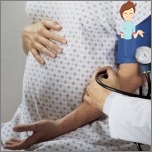List of analyzes for pregnant women – what you need to pass in the first, second and third trimesters
What tests need to pass a pregnant woman in the first, second and third trimesters? Full list of tests for pregnant women, description of the necessary research

During pregnancy, a woman and her future child are under the close observation of doctors. The gynecologist, who you are counting on, for each of his patients, is an individual examination program that a woman must adhere to for 9 months.
This program includes mandatory analyzes for pregnant women, which we will talk about today with you in more detail.
Analyzes that are surreated in the first trimester of pregnancy

The first analysis in the first trimester, of course, is pregnancy test. It can be both home test and urine laboratory analysis at the level of hormones hgch. It is carried out on the period of 5-12 weeks of pregnancy, because at this time the woman begins to suspect that it is in position. This test allows you to confirm that the pregnancy has really come.
After receiving the results, the future mother should be as soon as possible Visit your gynecologist, To become taking into account the observation of pregnancy. During this visit, the doctor must hold Full physical (Measure growth, pelvic bones, blood pressure) and gynecological examination.
During Vaginal inspection The doctor must take from you the following tests:
- Smear papanicalau – reveals the presence of abnormal cells;
- Mail on microflora vagina;
- Bacterial sowing and smear from the cervical canal – detect sensitivity to antibiotics;
- Smear to identify hidden genital infections.
If pregnant has Erosion of the cervix or her signs, The doctor must hold Colposcopy.
After all these manipulations, the doctor will give you the directions of analyzes that must be passed in the first trimester of pregnancy:

- Blood test during pregnancy:
- general;
- Blood biochemistry;
- Blood Group and Russel Factor;
- on syphilis;
- on HIV;
- on viral hepatitis B;
- on torch infection;
- on the level of sugar;
- To identify anemia: iron deficiency and sickle-cell;
- Coagulogram.
- General urine analysis
- Direction by Passage of climbing: Okulist, Neuropathologist, Dentist, Surgeon, Therapist, Endocrinologist and other specialists.
- Electrocardiogram;
- Ultrasound uterus and her appendages
In addition to the above mandatory analyzes, your obstetrician gynecologist on the 10-13 week of pregnancy can designate First perinatal screening, so-called «Double test».
You will need to pass the blood for two hormones (beta-hCG and RRR-A), which contains information about the risks of development in a child of congenital defects and diseases (for example, Down syndrome).
Second trimester of pregnancy: tests

For a period of 13-26 weeks during each visit to the women’s consultation, the doctor is obliged to measure your weight, blood pressure, abdominal roundance and the height of the uterine bottom.
In the second trimester of pregnancy you must pass following analyzes:
- General urine analysis – allows you to identify the infection of urinary tract, signs of preeclampsia and other deviations, such as sugar or acetone in the urine;
- General blood analysis;
- Ultrasound fruit, during which the child is checked for disorders of physical development, as well as determine the longer period of pregnancy;
- Glucosotolerant test – it is assigned for a period of 24-28 weeks, determines the presence of a hidden gestational diabetes.
In addition to all the above analyzes, on the period of 16-18 weeks, an obstetrician gynecologist will offer you to pass Second perinatal screening, or «Triple Test». You will check the indicators of such hormones as HCG, EX and AFP.
This test will help identify the risks of developing congenital defects and chromosomal deviations.
List of analyzes in the third trimester of pregnancy

In the third trimester of pregnancy, women’s advice will need to visit once every two weeks. During the visit, the doctor will conduct standard manipulations: weighing, measuring blood pressure, abdominal roundedness, uterine bottom height. Before each visit to the doctor’s office, you need to pass General analysis of blood and urine.
On the period of 30 weeks you will need to pass all the tests that were appointed during the first perinatal visit in the first trimester of pregnancy. You can see their full list above.
In addition, you will need to go The following studies:
- Uzi Fetal + Dopplerograph – Assigns for a period of 32-36 weeks. The doctor will verify the condition of the child and explores the placental and umbilical channel. If during the study, low placentating or placenta will be revealed, the ultrasound will need to be repeated at later pregnancy (38-39 weeks) so that you can determine the tactics of childbirth;
- Cardiotocography of the Fruit – Assigns to the 33rd week of pregnancy. This study is necessary to verify the intrauterine state of the child. The doctor will monitor the motor activity and heartbeat of the baby ChISS, will find out if the child has an oxygen starvation.
If you have a normal pregnancy, but its term is already exceeding 40 weeks, the obstetrician-gynecologist will appoint you the following tests:

- Full biophysical profile: Ultrasound and unresponsive test;
- Ktg monitoring;
- General urine analysis;
- Daily urinary analysis on nurturenko or in Zimnitsky;
- Urine analysis for acetone.
Research data is necessary that the doctor can decide, When to expect a birth, And is such an expectation safe for a child and mother.


